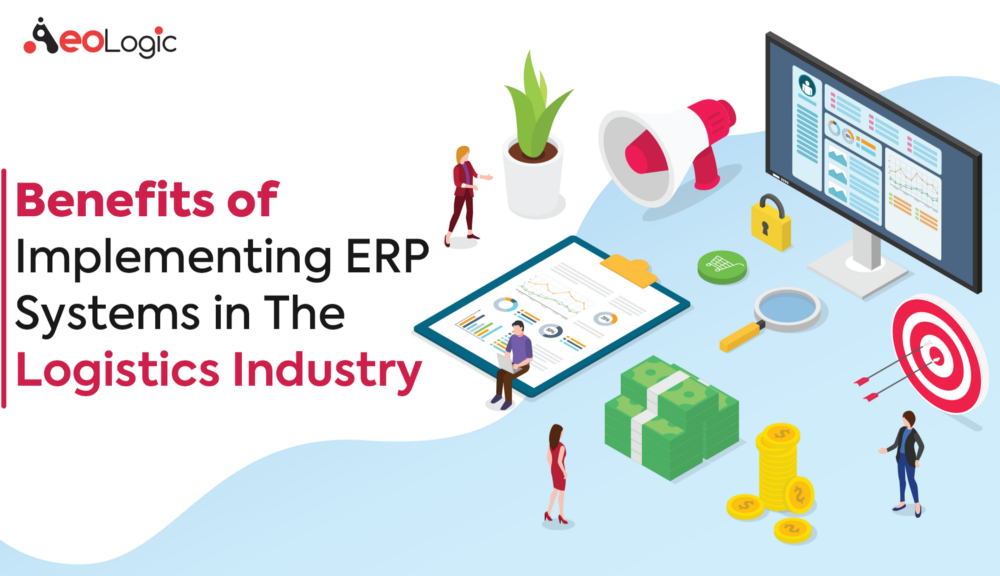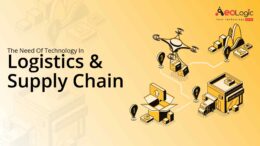The logistics industry is the backbone of commerce and supply chains around the world. The radical growth in the logistics and transportation industry is undeniable, visible to everyone. With the rise of eCommerce and opening up of the global market allowing a convenient flow of supply and demand, the logistics market takes a leap towards being one of the important industries contributing to the world economy. Logistics needs high levels of competency when it comes to managing high volumes of real-time data, fulfilling supply chain management, freight management, transportation, warehousing, storage, and maintenance tasks. ERP for the logistics industry is a definitive tool that can handle constant changes, uncertainties, and unpredictable cost fluctuations with automation and superior system intelligence.
In this article, we will see what and how the ERP system benefits this huge industry in details. But first, let’s understand the basics.
What is ERP?
As an acronym, it stands for Enterprise Resource Planning and is responsible for seamlessly operate various processes that influence the success of running a business. As software, it looks after accounting, human resources, inventory and order management, customer relationship management (CRM), and much more. For a layman to understand the basics of what an ERP function like does, it is, to say the least, that as the software it deals in integrating various functions compiling them onto a respective system. This allows in process streamlining and dispersal of vital information across the entire organization.
To break it down, it simply means that employees in different layers of work divisions, like accounting or sales, can solely depend on the same information for their respective needs and accelerate their business performances. Thus, being such benefitting software, it is a pivotal role to play in the domains of transportation and logistics.
Now that we know what ERP is, let’s see how it benefits the logistics industry.
Benefits of ERP for Logistics Industry
ERP software generally has the ability to integrate easily into many industry domains with various application purposes bringing all the major attributes of a business under a single dashboard to monitor and command.
Customer Portal
A prolific ERP system in logistics comes with a vendor/customer portal to allow easy login to the account and monitoring of the aligned processes, promptly and efficiently. All communications are integrated through email or secured SMS systems that allow the user to receive updates in their personal profiles.
Inventory Control and Stock Visibility
One of the most vital tasks to ensure operational fluency in logistics and transportation is having complete control over the inventory. The most important things to keep a note are the current requests, stock, current deliveries on the route, and the sales tally. An ERP software brings all the notable works under one single dashboard allowing business heads to keep a keen eye on the current status of their inventory.
This can bring a much need to influence the logistics and transportation industry leveraging them with essential tools and the right information to handle inbound or outbound orders, determining the number of items present in the inventory and out of stock items. Having complete information of the inventory status allows leaders and managers in the logistics industry to make better and faster decisions at times of dispatching or placing orders.
Easy Maintenance
In the logistics and transport industry, the biggest assets are the vehicles and the person in charge of the vehicles. As the logistics network becomes complex maintaining and planning for the transit schedules becomes more difficult. With time such complexities in managing the schedules can hamper the logistics and transport business to a great deal. ERP software solutions make it much easier for the business while handing over total control and complete visibility to the complete logistics or supply chain network. This ultimately enhances the operational fluency of the business.
Improved Distribution Management
An ERP system in logistics speeds up distribution times and enhances distribution channels. It can be programmed to pick data from social media, customer review feeds or in-house historical data to improvise the delivery processes. Suppliers, distributors, delivery partners, and retailers can be on the same page when it comes to key delivery, transit, inventory, payments, orders, collections, traffic information, escalations, customer experience, and many other aspects. Once business leaders have all the necessary information right in front of them, it becomes easier to make a decision, understand ordering trends, comprehend the reasons for any delay, and effectively handle customer escalations.
Governance With Real-Time Tracking
Vehicles in-transit can be tracked using GPS integration in real-time for customer updates and control room insights using the advanced location features and valuable Business Intelligence of logistics ERP solutions. This enhances the overall customer support system for the business and also allows the business leaders to leverage real-time and accurate data. This helps the logistics industry in developing better business plans with better business intelligence.
Enhanced Staff Management
Managing the work hours of freight operators, break times, leaves, payment bonuses, overtime, accident claims, performance analysis, insurance, etc. can be easily converted to automated modules with the help of ERP distribution systems. A Mobile ERP solution for the logistics industry implements an additional level of security with data backups for all the activities that fall under human resource management. With key performance indication feature installed with the ERP software, leaders can have access to ready-made reports on employee performance allowing them to make better workforce decisions.
Conclusion
Thus, with so many advanced features and benefits you gather from integrating an ERP system in your business domain of transportation and logistics, you have already accelerated ion chasing maximum profits. With the competition in the market getting more stifled, being prone to the delay of an ERP integration can cost you high. The more streamlined the logistics company can be, the more profitable it becomes for not only themselves but their customers as well. Using an ERP system, for this reason, is hugely beneficial to all stakeholders involved in logistics. So get started today.
Do you also want to get your logistics company up to speed with the latest ERP software, to help streamline your business?
Feel free to connect with us.
At Aeologic Technologies, We combine our market research expertise across an array of technologies that help in building a better future. We’ve been carrying out qualitative and quantitative research projects for our clients for several years, establishing ourselves as the gold standard in reliable technical research.






